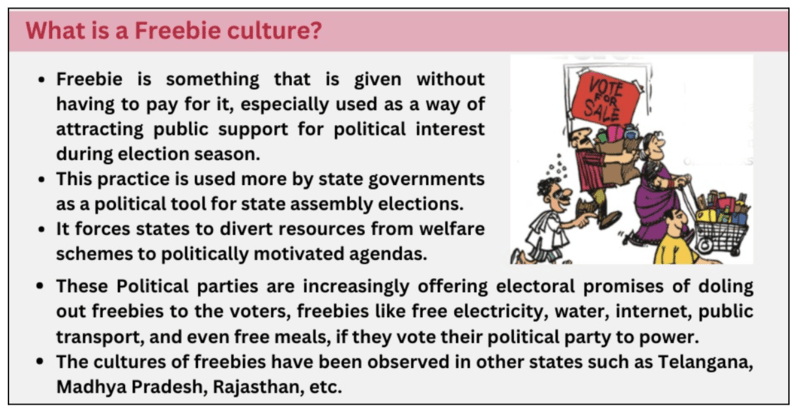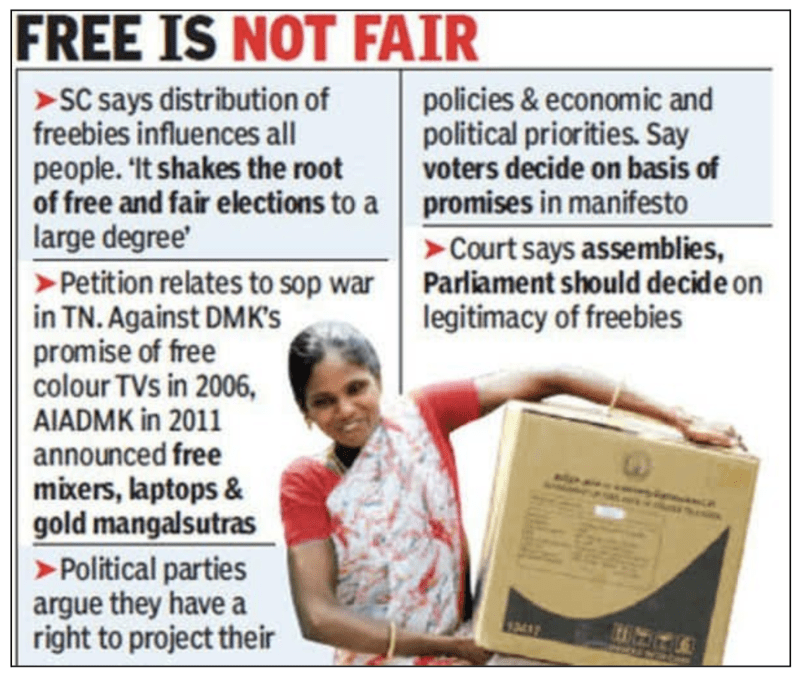What elite critics of freebies don’t understand?

Relevance: GS II (Polity and Governance)
- Prelims: Judicial reach and intervention (landmark Judgments); Election Commission of India
- Mains: Parliamentary democracy; Judicial reach and intervention (landmark Judgments); Model Code of Conduct
Why in the news?
With ongoing various state elections, much of the intellectual class has condemned the expansive welfare agenda declared by political parties.

Does Freebie Culture always provide results?
- Indian voters are mostly aware and smart by linking freebies and voter behaviour. Today, because of increased political competition, most political parties announce freebies. Hence, their net impact may be nil.
- For Example, in the Chhattisgarh state assembly election, the loan waivers promised by opposition parties were believed to have helped them win the election. But they lost in the Lok Sabha election.
If “freebies” are so wasteful, why do political parties succumb to them?
- To secure victory in the upcoming election: Generally, Political parties succumb to freebies to secure a victory in the upcoming elections. The primary job of any political party is to capture state power.
- In Indian states, where the overall government is comparatively better, parties go for freebies because they are out of other ideas to attract votes.
- They usually try to go beyond the development work already done with respect to water, electricity, roads, and subsidies.
- To showcase previous development: Every chief minister wants to showcase development in his/her state. However, governance for “development” is complex and has many contingencies.
- Fixing a single issue cannot be the priority, but the ability to recalibrate the political economy without losing power is.
- On the other hand, building infrastructure or cash transfers are relatively easier. It thus makes political sense to earmark a part of the state budget for direct benefits to ensure that each voter is touched positively and tangibly.
BEYOND EDITORIAL:
Freebies Culture Vs. Indian Democracy:
Indian democracy is vibrant and is looked upon by the world, especially in developing countries, as a role model of democracy.
- Neither sustainable nor economically viable: Freebies underestimated the electoral judgment of the voter, the election process, the political system, and parliamentary democracy. Other essential schemes will suffer since the money used for freebies must be funded from the overall budget.
- Hence, it is an unhealthy practice that takes up and uses the taxpayers' money, and due to this, the freebie culture is neither sustainable nor economically viable.
- Legality and Reach of Election Commission of India: The powers of the EC are limited in regulating the freebie culture if introduced by a party in power.
- Lack of credibility: Secondly, there is no legality to these promises made by political parties. The promises made in the election manifesto cannot be construed as ‘corrupt practice’ under Section 123 of the Representation of Peoples Act.
- Diversion of unaware voters: There is a significant difference between Freebies and poll promises. Subsidies are required for the proper functioning of a government to fulfil peoples’ needs. However, these subsidies are sometimes confused with freebies.
- Promoting Elite Culture: The growing freebie culture can reflect elitism by treating the poor as dependent, which may promote demand-driven democracy.
Supreme Court on Freebies Culture (Judicial intervention):

- In the Subramaniam Balaji vs. Govt. of Tamil Nadu Case of 2013, the existence of freebie culture observed in Tamil Nadu has been challenged in the Supreme Court.
- The apex court identified that the case falls in the Election Commission's (EC) domain and gave the EC guidelines to revise the model Code of Conduct to check the corrupt practices.
- Further, SC in its 3-judge bench of NV Ramana in 2022, observed that “this unhealthy practice is creating a situation wherein the State Government cannot provide basic amenities due to lack of funds and the State is pushed towards imminent bankruptcy.
- In the same breath, we should remember that such freebies are extended utilising taxpayers' money only to increase the party's popularity and electoral prospects.”
- The new model code of conduct laid clear guidelines to ensure that political parties do not make such promises in their manifestos. It states that the distribution of freebies of any kind undoubtedly influences the people and shakes the root of free and fair elections to a large degree.
Way Forward:
- Learnings from other countries: Our Indian Constitution and Democracy were built and borrowed from the best features available from other nations. Similarly, it is time to note that all over the world, elections are fought based on the government's performance or the lack of it.
- Need to change the implementation path: Political parties in power must concentrate on constructive activities during their five-year term in office. If the government succeeds in passing on the fruit of development to the voters, freebies will not work.
- Need to draw the line between Welfare and freebies: Awaking and educating the voters enough will prevent them from falling for such political agendas. Distinguishing between subsidies and freebies and understanding the economic implications is essential.
- Autonomy to ECI: The Election Commission must revise the election code of conduct by legally binding the political parties to fulfil the promises. The state finances are finite; thus, all expenditures must be subjected to a comprehensive review of relevant trade-offs.
- Hitting the exact goal: Parliamentary Democracy depends on the strength of political parties in power and opposition. Political parties need to focus more on the main issues of the time, i.e., food, jobs, national security, etc. Half the battle is won even before the election.
Mains PYQs
Q. Discuss the role of the Election Commission of India in light of the evolution of the Model Code of Conduct. (UPSC 2022)
Q. ‘Simultaneous election to the Lok Sabha and the State Assemblies will limit the amount of time and money spent in electioneering but it will reduce the government’s accountability to the people’ Discuss. (UPSC 2017)
Prelims PYQs
Q. For election to the Loksabha, a nomination paper can be filed by (UPSC 2017)
(a) Anyone residing in India
(b) A resident of the constituency from which the election is to be contested.
(c) Any citizen of India whose name appears in the electoral roll of a constituency.
(d) Any citizen of India.


